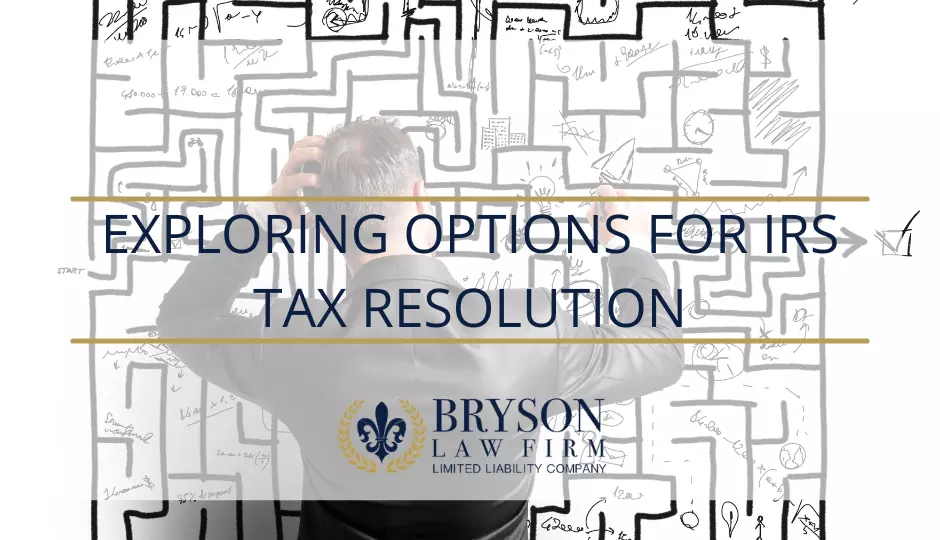When facing a tax debt, it’s important to explore all available options to resolve the issue. The first step: Don’t panic! Looking into different resolution options to determine which one would be the best fit for your specific situation is essential. Depending on the situation, you might be able to qualify for one of the following tax resolution options.
Options for Tax Resolution
- Installment Agreement
An Installment Agreement allows you to set up monthly payments to pay off the tax debt that you owe over a period of time. Now, while penalties and interest continue to accrue during an Installment Agreement, many people still find this to be the most viable option for them if they don’t have the money to pay the tax debt in full.
There are two different types of Installment Agreement. One is a Streamlined Installment Agreement. If you can agree to pay the balance you owe back over a certain number of months (typically 60-72 months but can be less based on the specifics of your case), you can request the Installment Agreement be set up without having to disclose your financial information. If a streamlined Installment Agreement is not an option, you’ll typically then have to provide financial information to show your monthly financial ability to pay the IRS. In this type of agreement, you may end up in a “partial pay” Installment Agreement, meaning you will not pay the full amount owed back within the amount of time the IRS has to collect it from you.
Once an Installment Agreement is in place, the collection notices and phone calls from the IRS will stop but for some annual reminder notices they’ll send as a matter of course.
In certain types of Installment Agreement, the IRS may be able to perform a “periodic review” of your financial situation to ensure the monthly amount you’re paying is appropriate.
The IRS can and typically will file a lien in the public records until your tax bill is paid in full. In certain streamlined Installment Agreements, you can request that a lien not be filed.
An Installment Agreement can be very helpful so that you aren’t put under financial strain while paying off your debt.
- Offer In Compromise (OIC)
An Offer in Compromise is one of the most coveted resolution options available. If you want to pay off your tax debt but are unable to pay the full amount due to financial reasons, an Offer In Compromise might be right for you.
To qualify for an offer in compromise, you must be able to show the IRS that you cannot pay the full amount back – even over a period of time. You’ll prepare a detailed financial workup to accompany your request. It takes several months for the IRS to review and render a decision on your Offer.
While the IRS does want their money and needs to make sure a taxpayer will be able to fulfill their payment obligations, they do consider a person’s financial situation along with certain extenuating circumstances when evaluating whether an OIC is an acceptable resolution.
- Currently Not Collectible (CNC)
While CNC status is not always a permanent fix, it can at least give you a break from the IRS phone calls and collections letters and will prevent or remove the levies or garnishments that the IRS can place on your wages or bank accounts while you get your financial house in order.
As with an Installment Agreement is important to keep in mind that the IRS can still place liens on your assets during CNC.
The tax debt will still need to be paid later, but if you can prove hardship you might qualify. The IRS will require you to provide proof of your current financial situation so that they can evaluate if you are able to make payments towards your debt. If you are put on Currently Not Collectible status, the IRS will continue to monitor your financial situation to determine when you will be able to pay your tax debt. Penalties and interest will continue to accrue during this time.
In some situations, it may be possible to remain in CNC until the 10-year Collection Statute Expiration Dates pass. In this situation, balances may be written off your accounts without payment.
- Innocent Spouse Relief
Filing a joint return legally obligates both parties to pay any taxes that are owed. However, under certain circumstances, a person might be found “innocent” if there was deception or abuse involved, such as unreported income that the spouse was unaware of, domestic violence, and more. If the IRS agrees to grant Innocent Spouse, you may no longer be held responsible for joint tax liabilities owed.
Keep in mind that this list is not exhaustive – there are many different approaches to IRS Tax Resolution. There are also many complexities and nuances involved when obtaining one of the listed resolution options. Tax problems are legal problems. That is why at Bryson Law Firm, LLC, we always recommend that you seek counsel when dealing with an IRS matter. Need help resolving a balance due to the IRS? Contact Bryson Law Firm, LLC today for your free, initial consultation.























